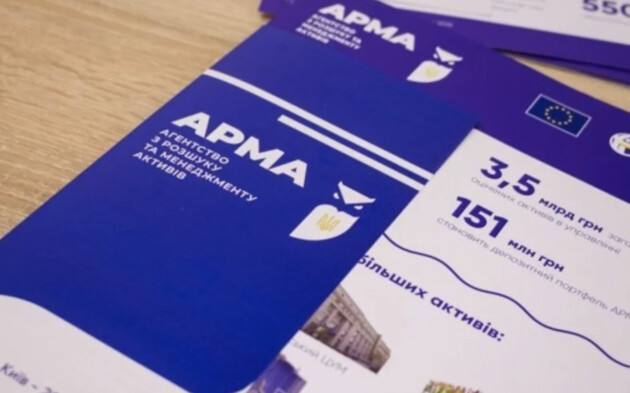ARMA: Much Needed Legislative Changes

article by OLEKSANDR LIEMIENOV, StateWatch CEO
A month ago, the anti-corruption committee of the Verkhovna Rada developed and submitted draft law No. 8184, aimed at unlocking the opportunity to manage corporate rights assigned to the National Agency for Finding, Tracing and Management of Assets Derived from Corruption and Other Crimes (or Asset Recovery and Management Agency, ARMA).
The draft law was initiated by MPs Halyna Yanchenko, Serhii Shvets, Volodymyr Kreidenko, Yaroslav Yurchyshyn and others.
The issue that parliamentarians sought to handle is quite simple: it is necessary to finally create legislative prerequisites for enhancing the efficiency of the system of search and management of assets (property) obtained from corruption and other crimes, including assets (property) of residents of the aggressor country.
However, the key thing in the draft law still concerns the elimination of legislative barriers that rendered it impossible to effectively manage the corporate rights of enterprises whose controller (beneficiary), directly or indirectly, is the Russian Federation. This, in turn, is the research topic of our Trap Aggressor project.
So in view of the submission of the said draft law, a logical question may arise: can the legislator have failed to establish appropriate opportunities for ARMA to manage corporate rights that have been seized?
Part 7 of Article 21 of the Law of Ukraine “On the National Agency of Ukraine for Identification, Search and Management of Assets Obtained from Corruption and Other Crimes” provides for such an opportunity; in so doing, however, it also requires obtaining the consent of the owner of the corporate rights in question. As of now, legislators propose waiving this requirement if the relevant corporate rights are owned, directly or indirectly, by Russian residents. In this case, the actions of the Ukrainian state do not have to be agreed with the owners of the aforementioned corporate rights. Similar things apply to residents of countries supporting Russia’s aggression in Ukraine’s territory.
The idea, albeit a bit overdue, is certainly correct. After all, it's been almost a year since Russia’s full-scale invasion started. And now we will add some comments that were expressed by the key stakeholders of the process.
First of all, it is far from clear from the content of the draft law who and in what way will establish the fact of the decisive influence (beneficiary status) of a resident of the Russian Federation, whose assets (property) are transferred to ARMA for management. Things like this should probably be decided by the court and not left to ARMA as discretionary powers. In addition, the Chief Scientific and Expert Department of the Verkhovna Rada apparatus (GNEU) notes that legal definition of the term “residents of countries supporting the aggression of the Russian Federation in the territory of Ukraine” is necessary. Currently, this is not specified in the current legislation; from a purely logical standpoint, subsuming Belarus alone under this category will not suffice. We are building a legal state, not a vertically integrated structure of public authorities dictated by the political will of the Office of the President and the personal guarantor of the Constitution, right?
In its own right, the National Agency notes that in order to unlock the opportunity for asset management in the form of a share in the authorized (compounded) capital or shares, shares of specialized legal entities, draft law No. 6233 of October 29, 2021 was submitted to the parliament, which proposes to exclude part 7 of the abovementioned article altogether. The rationale is that, in the current format, ARMA cannot objectively implement the powers entrusted to it. The GNEU is of the same opinion: the National Agency cannot fully manage such assets as a commercial bank, insurer, credit union, real estate fund manager, leasing or factoring company, pawn shop, etc. The Ministry of Justice concurs, which is why it suggests adopting two bills at once – No. 8184 and No. 6233.
Now let’s consider the position of the National Bank of Ukraine, which conceptually supports the draft law, but at the same time suggests finalizing the document. Among his proposals, the following was recorded: in order to prevent cases of destabilization of the state of financial institutions (for example, banks), the duty of the manager to coordinate the measures set forth in the current legislation regarding the relevant assets (property) with the National Bank and the National Commission on Securities and the Stock Market as state regulators of financial services should be preserved. It is also necessary to update paragraphs 3–4 of part 7 of article 21 of the law regarding the National Commission, which carries out government regulation of financial services markets, in connection with its liquidation pursuant to the decree of the President of Ukraine No. 259/200 dated June 30, 2020.
Finally, here’s the position of the flagship of the country’s criminal justice system — the Prosecutor-General’s Office. From its office on Riznytska Street in Kyiv, a comment is again made about the legal definition of the terms “indirect founder or beneficiary” and “residents of countries that support the aggression of the Russian Federation in the territory of Ukraine” in the current legislation, as well as the list of relevant countries. The subordinates of Prosecutor-General Andrii Kostin also point out that the provisions of paragraph 1 of Section II “Final Provisions” of the draft law are incorrect, because the procedure for criminal proceedings in the territory of Ukraine is determined only by the Criminal Procedure Code. Prosecutors are also asked to enshrine the need for approval by the Cabinet of Ministers or other government-authorized public authority of ARMA's actions regarding the management of such assets (property).
We asked one of the key initiators of draft law No. 8184, Yaroslav Yurchyshyn, a member of the Holos (Voice or Vote) party, for a comment. The MP noted that the draft law is particularly important because it unblocks the work of ARMA.
Firstly, the document is aimed at eliminating the legislative obstacle that blocks the execution of the court’s decisions on the transfer of assets that are being executed by the National Agency. These are more than 70 court decisions where transferred assets belong to residents of the Russian Federation. However, the execution of decisions is currently blocked, all because of the need to coordinate the management of corporate shares with their owners, whose location is often unknown or deliberately hidden.
Secondly, as Yaroslav Yurchyshyn noted, he supports the observation that the term “residents of countries that support the aggression of the Russian Federation in the territory of Ukraine” wants legal certainty. It is not entirely clear how ARMA will establish that the founder or beneficiary of the resident is indirectly the Russian Federation or another relevant entity whose property management is transferred. It would be correct if this fact was established by the court based on the analysis of relevant materials. After all, ARMA does not have access to all the materials of the criminal proceedings, which are necessary for a reasonable resolution of this question. There are also certain legal and technical issues that need to be resolved: it is necessary to determine the date of entry into force of this draft law.
Summing up, it is fair to argue that the said draft law needs to be adopted with appropriate refinement, as noted in the Chief Scientific and Expert Department of the Verkhovna Rada, the Prosecutor-General’s Office and the National Bank, along with the adoption of the changes proposed in another draft law No. 6233.
Read this article in russian and Ukrainian.
Please select it with the mouse and press Ctrl+Enter or Submit a bug











 Login with Google
Login with Google